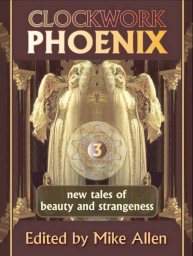REVIEW: Clockwork Phoenix 3: New Tales of Beauty and Strangeness
Friday , 19, September 2014 Book Review 1 Comment You know you have a good anthology of short stories when John C. Wright’s “Murder in Metachronopolis” is one among equals. Even the freaking foreword is good:
You know you have a good anthology of short stories when John C. Wright’s “Murder in Metachronopolis” is one among equals. Even the freaking foreword is good:
The cosmos spins its gears and stretches wings, the ticks of its constant grinding both too slow and too rapid to ever be detected. When it collapses to ash, everything within the dimensional tiers of its clockwork body burns to nothing. Every pinion of this universe is a vane of time rooted in unfathomable past, grown up and out to form a spine that supports uncountable possible futures. And each of these feather-shafts fans out strands of temporal down that are themselves fractal branchings, mathematical quandaries of choices taken and not taken.
The Standouts
First and foremost is the aforementioned “Murder in Metachronopolis” by John C. Wright, a hard-boiled time travel noir that leaves the reader begging and pleading for more tales of the fall of the city beyond time. One can never get enough of Wright’s largiloquent linguistics, stuffed as they are with a cornucopia of cool concepts and a veritable panoply of perspicacity. Thankfully, there’s more of his palaverous prose. A lot more. Find your nearest Castalia House science fiction sidebar and order a DRM free version. For every purchase, my salary doubles.
Marie Brennan’s “The Gospel of Nachash” is astonishing apocrypha and biblical fan fiction about a “faerie Christ” set during the first few chapters of Genesis. One could easily imagine this coming from the fevered imagination of First Temple Enochic Jews in an alternate timeline where The Gospel of Nachash is included in the biblical canon. Equal parts mythopoeic and mesmerizing, the story reimagines the serpent of Eden as belonging to an order of creatures called the Bekhorim (“the firstborn”) who experience their own fall and redemption. Brennan also manages to satisfactorily answer that pesky question of where Cain and Able got their wives.
Michael M. Jones’s inspired and high concept “Your Name Is Eve” centers on a couple going on dates in other people’s dreams. Like one would expect, their romance must contend with dream logic and the disruptions of their sleeping host, before they dissipate into dreamdust. There’s more to the love affair than that, but so impressive is the way the plot unfolds—packing in many twists, turns, and tenderness—that it’s better to let spoilers vanish into the mists of slumberdom.
All the Rest
Results may vary for the remainder of the stories. I thought they ranged from pretty good (Tanith Lee’s “Fold”, about a recluse who writes poetic paeans to the strangers he spies from his apartment) to ho-hum (John Grant’s “Where Shadows Go At Low Midnight”, about…naked wolves? To be fair, I read this one pretty fast.) There’s a couple of ghost stories, one about a quest for the egg of an American dragon, and one that has Alexander the Great encountering a mechanical automaton. Others deal with subjects as far ranging as crow magic, synthetic sex partners, and mermaids on the moon. Fair warning, a couple of the selections are very light on the science fiction and fantasy elements.
This is an imaginative collection that is worthy of its namesake, and all the standouts are highly recommended. Tales of beauty and strangeness, indeed.
7/10 for John C. Wright and anthological awesomeness
Please give us your valuable comment